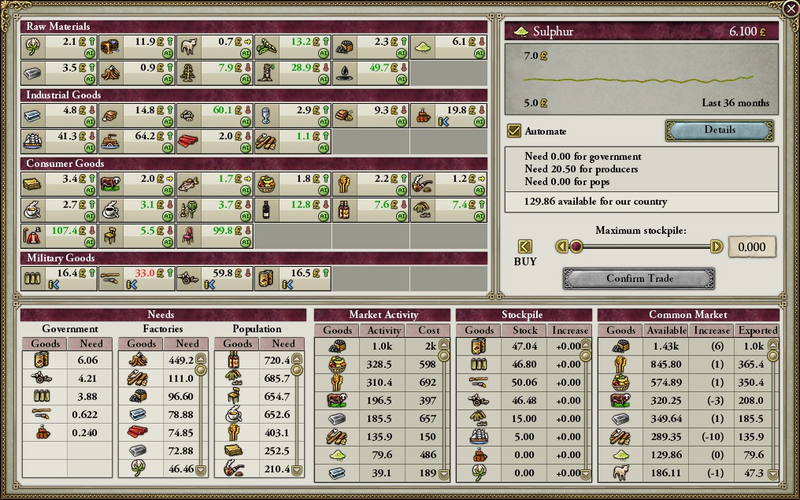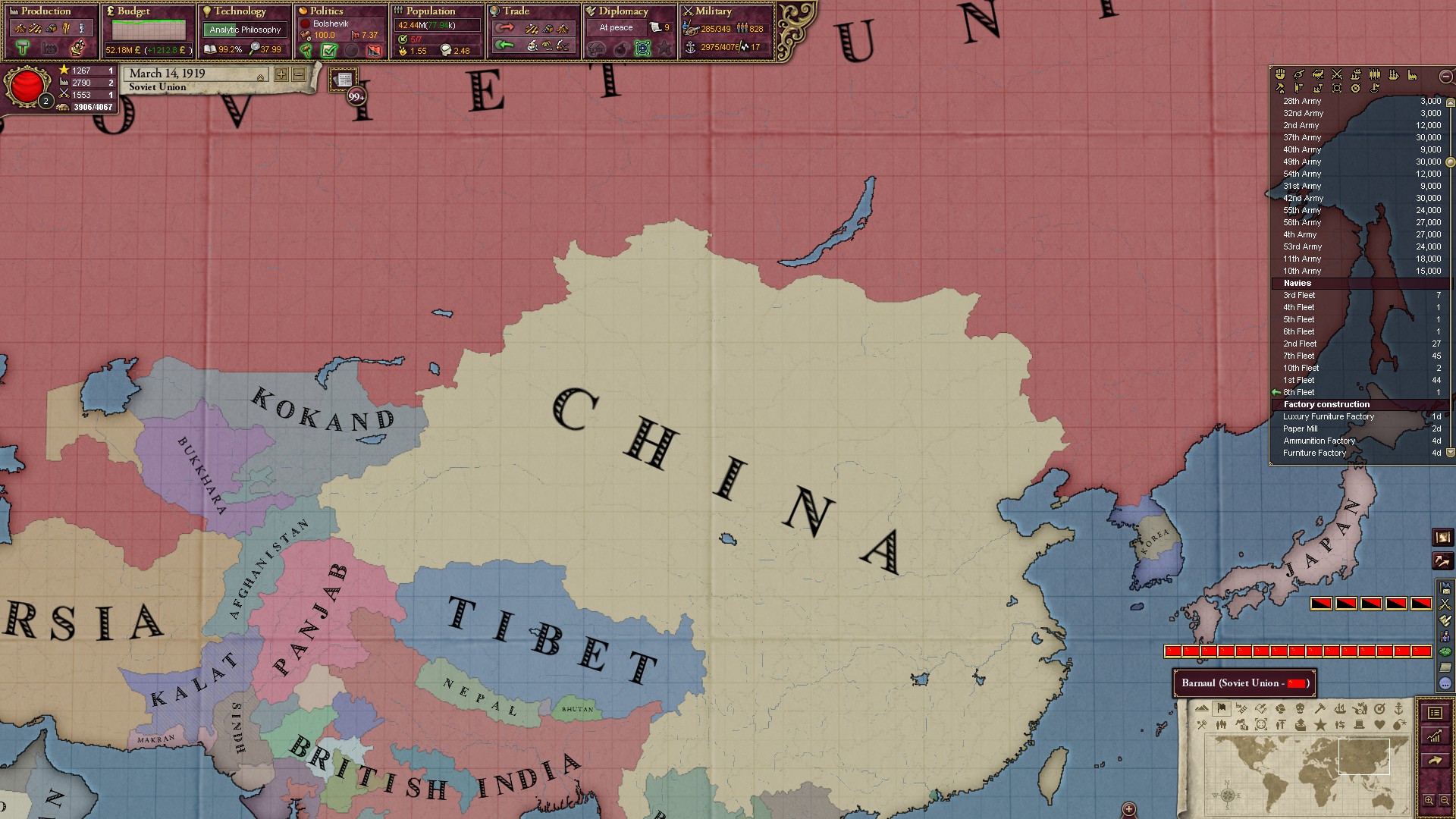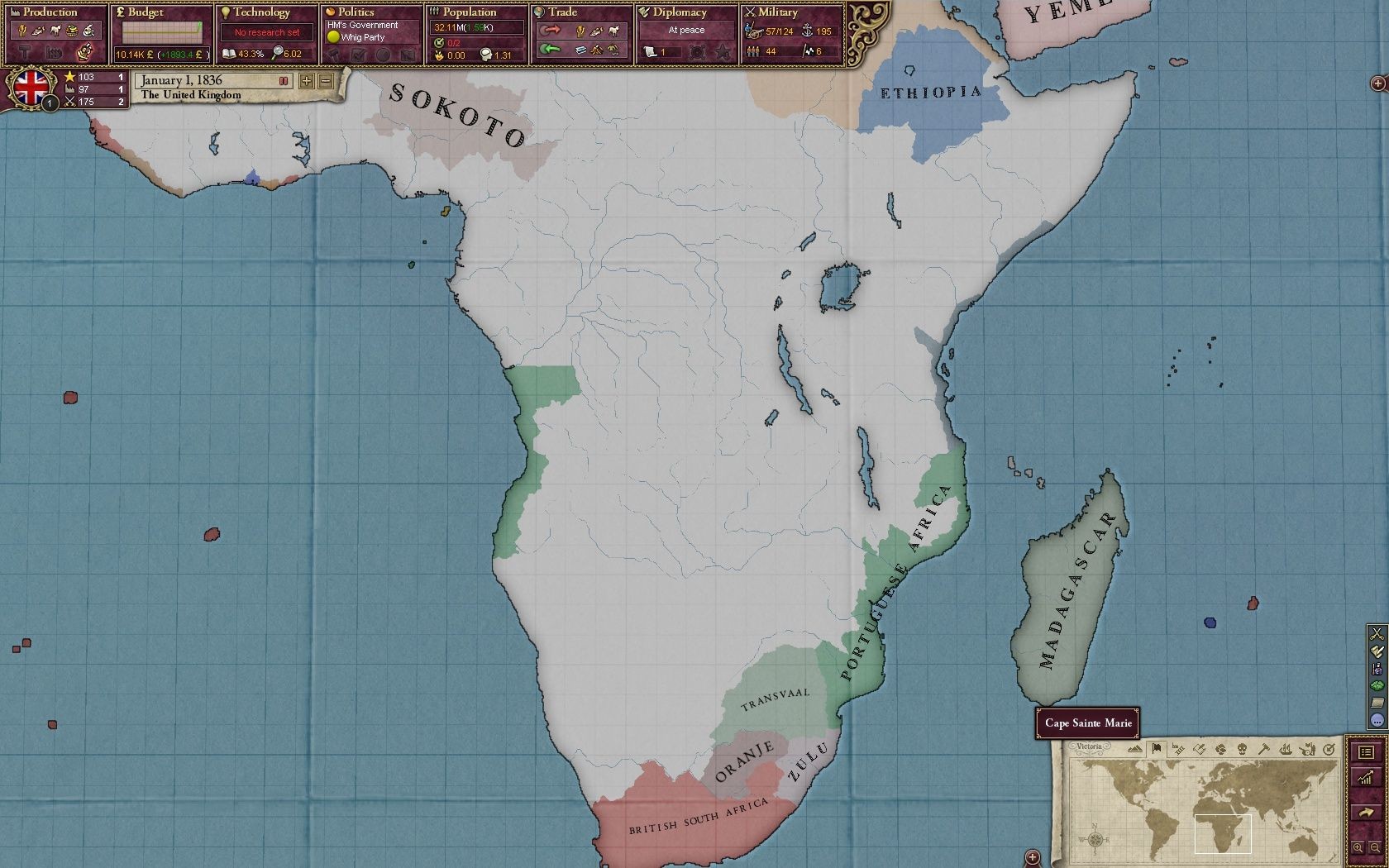Victoria 2: Gunboats and Opium
Introduction
Bored with the modern world? Do you long for an age where might was always right? Do the words "what if" appear in your vocabularly alot? If so, then Victoria 2 is the game for you. Taking place from the beginning of the industrial revolution, all the way up to the prelude of the second world war, Victoria 2 tasks you with building your nation from the ground up, and bringing it, kicking and screaming, into the industrial age. Turn your fields into factories, farmers into craftsmen and nations into empires, and follow in the paths of the greats, or forge new paths entirely, and change the face of the world forever.
Setting the scene
Victoria 2 is an economic simulator with military aspects. This essentially means there is less emphasis on conquest and more on the economy and managing it. Unlike other grand strategy games, there is alot more focus on playing tall, i.e, building up your country and economy, instead of simply conquering everyone. The most apparent aspect that seperates Victoria 2 from the others is its population (POP) system. The POP system is designed to reflect society, with all its different culutres, religions, poltical allignments and wants and needs. Like real life, POPS are the backbone of every country, and their wants and needs must always be taken into account whilst managing your nation.
On top of that, you must also manage the nations economy and secure its place on the world market. The economy is incredibly lifelike, and it takes thousands of tiny calculations into account, far too complicated to go over in this review, but fairly simple to grasp the basics. Before you industrialise and build factories, most of your population will work in Resource Gathering Operations (RGOS), which represents your nations natural resources. Goods such as coal and iron are vital to the industrial growth of a nation, so having good quantities of both is optimal. Exotic goods like silk, tea and opium are available too, and are essential for satisfying your upper class POPS, as well as being essential inputs for factories producing luxury goods. Later in the game, oil and rubber become incredibly contested resources due to their scarcity and usefulness in the construction of ships, tanks and automobiles

How does it actually play?
Gameplay in Victoria 2 is largely up to the player. No two games will play out the exact same, and no player has the same playstyle. Alot of variables come into play, like your population size, resource scarcity, allies and enemies etc. Generally speaking however, alot of time will be spent building naval bases, encouraging X POP type, researching technology, and managing factories (if your government type allows it) and most of all, preparing for war. As a player, your control of your nation is ultimately not that much if you're not social engineering your population. If for example, you are a democracy, you could get less control over your policies and budget, depending on the party elected. An Absoulute Monarchy however, has total control over everything, at the cost of facing the threat of constant revolution if not managed carefully.
Victoria 2 is huge in scope, so its hard to write a review without turning it into a guide, because frankly theres no other game like it. But like I said before, there is a persistent strategy of preparing for war, encouraging X POP type and making benefical diplomatic arrangements. But even then, if you don't plan on fighting any major wars, and instead prefer an economic hedgemony, the strategy can change massively. For example, if one prioritises industrial and comerce technology over military technology, they can become a great power by pure economic might. Fighting weaker Asian and African nations for resources and more POPS is easy even for the weakest European power, so you could play an entire game without getting dragged into a European conflict, whilst still maintaing great power status. With Spheres of Influence (SOI) mechanic, you can add weaker nations to it and be the first nation to get access to their produced goods, regardless of other nations status, all without fighting a single war. Sphered nations also get first access to your produced goods, so being in a sphere in the early game can be incredibly helpful.
War and Peace
Whilst entirely avoidable, war is also inevitable. Other nations will fight with or without your input, and those wars can effect every nation on earth if it involves great powers. Wars effect the world economy, and at the start of a big war, small arms and other goods required for unit production gain huge demand. Nations who are big producers of such goods will make more money on their taxes on capitalists (factory owners, depending on your econmic policy) and aristocrats (they control RGOs) Increasing tariffs in war time, as a non-participant, can bring in lots of money for the government, but also increases the price of importing goods, which your POPs will not like.
As a player, you will usually fight multiple wars with lesser powers and try to avoid upsetting the greater powers. The best way to get immediate territory is through war, naturally - thankfully war is a fairly basic mechanic in this game. Having better technology and generals, and also knowing when and when not to attack is all it takes, and of course sufficent ammount of soldiers. Terrain plays a huge factor in battles, so a defending army on mountainous terrain will be incredibly hard to defeat, even if your miltech levels are higher. In order to win wars, you need to achieve your war goals, which are decided before going to war. These goals can include total conquest, a concesion, dismantling fortifications, adding a nation to your sphere, puppeting a nation and more. If the goal(s) is achieved, they will accept that peace offer, and you win, gaining prestige and whatever your war goal was. Wars can be crippling for the losing party, paticularly if they had to cede an important state, like one that produces lots of coal, or has many vital factories.
China, for example, has the best RGOs in the game and as a result, they are frequently targetted by players and AI alike. One silk producing province in China accounts for a huge chunk of the silk market, and with sufficent industrial tech, that province can easily become the biggest producer in the world. The catch is that China has the most POPs in the game, and can recruit millions of soldiers at any time. Even though they are weak, they can beat an unprepared player by sheer numbers. In most matches, China does not westernize and gets carved by the Europeans, but if they do westernize, they become an unstoppable machine with swarms of trained troops and an industrial power completely unmatched.

Internal Affairs
Dealing with your neighbours is one thing, but the real threats can often come from within. It's all well and good conquering vast swathes of territory and building a vast army, but no soldier is going to fight for a government that he hates. As the game goes on, the world changes and with it so does the POPs. Like real life, the industrial revolution was also a social revolution, with new ideas like universal voting and abolition. POPs will desire reform, and not reforming will slowly build up a dissident populace who can, and usually will, take arms. Not all POPs will want reform though, and you can actually find out political allignment of every POP, and can actually influence elections by increasing party loyalty in the states with most voters, or states full of a certain POP type who lean to your prefered government. Revolutions are nothing to be afraid of, they happen to almost everyone and the majority of them can be managed and defused. Some revolutions are unstoppable, where huge sections of the population take arms, killing them all would hurt the country more than letting them take over.
To maintain stability requires a few things. Mainly, it is fulfilling as much as your POPs needs as possible, and minimizing unemployment. Other factors can also come into play, like reforms, but passing them is simple enough. POPs in newly conquered territories tend to be rebellious too, so keeping some soldiers nearby is always recommended. Generally, a failed revolution will not be suceeded by another one for years, and if you meet their demands peacefully, it will not happen again. But if your country is in complete turmoil, like after losing a costly war AND already having a pissed off populace, revolutions will come and go and some countries never recover.
Colonialism
My personal favourite aspect of Victoria 2 is how populations and culture changes dynamically, and colonialism plays a big role in this.As an example, at the beginning of the game, Portugal has colonies in Africa and Asia, with small Portugese minorities. Later in the game, those provinces can dynamically change so that it could be majority Portugese, or if the colonies gained independence, the Portugese population would slowly dwindle. Colonies where the populations government is majority your culture can become intergrated into states, which means added tax efficency and the ability to construct factories. However, this would also give everyone in your colony the right to vote, depending on your policies, and that could be a terrible thing if the colony has different political leanings.
Colonialism is arguable the most important aspect of gaining and maintaining world power status. European nations, whilst technologically more advanced than the rest of the world, have small POPs and valuable RGOs like coal and rubber are few and far between. The existing coal deposits are owned by the major powers, or in heavily contested microstates, thus making true industrialisation very hard as a minor European power. Colonisation allows the top 16 powers to annex and develop uncolonized lands without incuring the costs of war. Colonisation, like real life, is a race to the top, and it is highly recommended you take part in that race and plan decades in advance. In order to colonize, you need 3 inventions from 3 different technology trees, as well as sufficent naval range. Naval range is increased by building more ship yards, or by having a ship yard near the territories you wish to colonize.
The scramble for Africa is gamechanging as it can provide not only vast amounts of previously unattainable resources, but also vast amounts of POPs. You can raise thousands of African soldiers to fight your wars for you, and if your colonies become states, you can seriously increase your production output by building factories and hiring the colonies workers.
With new land comes new challenges, and the colonies have their own set of challenges which can cripple you if not addressed. If your colonies are not paticularly fond of their new overlords, they can revolt and declare independence, or in the case of Africa, entire sections of the continent can and often do get engulfed in eternal revolutions and carnage. This is easily avoidable however, and is managed much the same way as managing the rest of your POPs. When the great powers have secured their foothold in Africa, it often becomes Europes battlefield, and colonies regularly change hands. Paticularly valuable colonies include Cameroon, Nigeria and the East Indies, which produces most of the worlds sulphur, an incredibly important resource required for vehicles and weapons.

Summary
Taking all these things into account, you'll probably realize this isn't a very fast game. Compared to other Paradox titles like EU4, it is very fast. The average game for an amateur player is around 8-10 hours. For people who play on full speed and minmax everything, probably half. Although it takes place from 1836 to 1936, alot of players don't reach 1936 because they're already number one world power. This game doens't require your attention as much say, an FPS, but theres enough going on in the background that you should be keeping an eye on. Time spent idling, should be spent plotting new plans for conquest, or development, or both. There should never be a wasted moment. For most nations, the early game is simply researching the important techs and building railroads. Alot of waiting, not much fighting. Ideally you'll have at least one thing in the works - be it research, railroads, factory construction or building up your army or navy.
Whilst the basics have been more or less covered in this review, there is still lots, lots more to this game than this review would allow. I will be writing a short guide to convey information in a more nuanced manner.
Things to consider before buying
A game of this scale is bound to have some issues, but fundamentally, the game is not broken and it miracously works. My biggest gripe by far is the performance issues. Mid to late game, it stutters alot and you can get frequent crashes, even on modern systems. I'm not a technician by any means, but I believe the amount of different POPs, and all the action in the near life-like economy, is incredibly taxing on the CPU. On my system I get multiple crashes on a playthrough and there has been times where I just gave up because it was becoming so frequent. Another issue I have is the capitalist POPs being largely hit or miss. Yes they provide production bonuses, and they build factories without costing you a dime, however, they cannot build appropiate factories. For example, in a state where coal and iron are produced, capitalists will build a winery, or something else equally inappropiate. Depending on your government type, you cannot stop them.
The thing you should take into consideration most before buying this is the learning curb. My explanations barely scratch the surface, and you will spend alot of time completely puzzled if you're unfamilar with the genre. It is recommended you do alot of reading about the game before fully diving into it, as it really does make a difference. Once you grasp some of the wider concepts like POPs and production, the rest of the game begins to make much more sense. Just bear in mind, it is like an investment with your time, having to learn everything then actually play through a game, may be a little too much for some people. There is an ingame tutorial but again, it barely scratches the surface.
AI is another grievance many people share about the game. It is not paticularly smart, espeically when it comes to managing their navy, and it can produce some comical or annoying results. Allying Britain seems good in theory, seeing as they're the most powerful nation in the game, but they rarely come to your aid during a war, and even if they do, they can barely move their vast armies because they can't handle managing a navy, ironically enough. As well as that, the AI loves creating world wars out of irrelevent backwater provinces. Almost every game I've played there has been at least one great war over an island with bad POPs and bad RGOs. It's ridiculous but as long as its not your island, it's pretty funny.
Conclusion
If leaving your mark on the world sounds appealing to you, you will enjoy this game. You can take your favourite country and change its destiny like changing a tyre. In essence, the game is a spread sheet simulator, and the enjoyment most people derive from this game is the historical roleplaying and world building. To alot of people, it seems incredibly boring and tedious, and I can see why they'd think that, however, if you're interested in this period of history, no other game comes close in scope and ambition.








